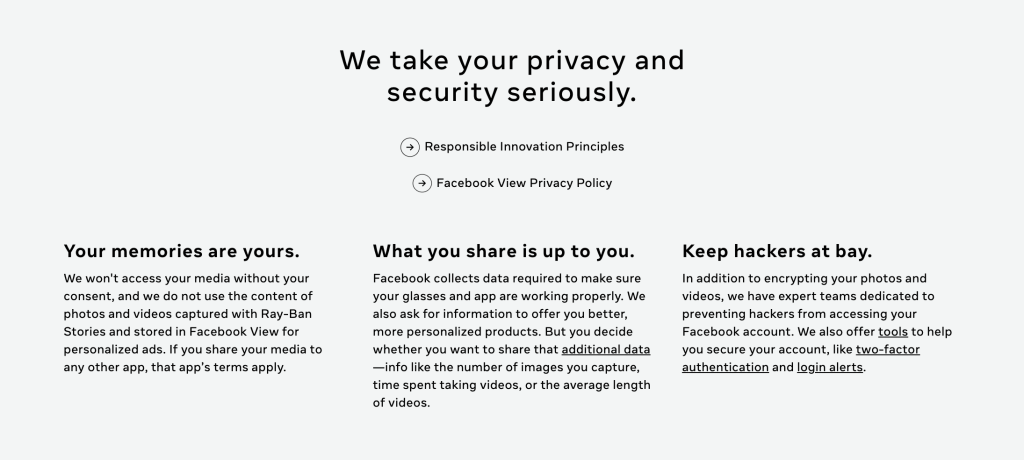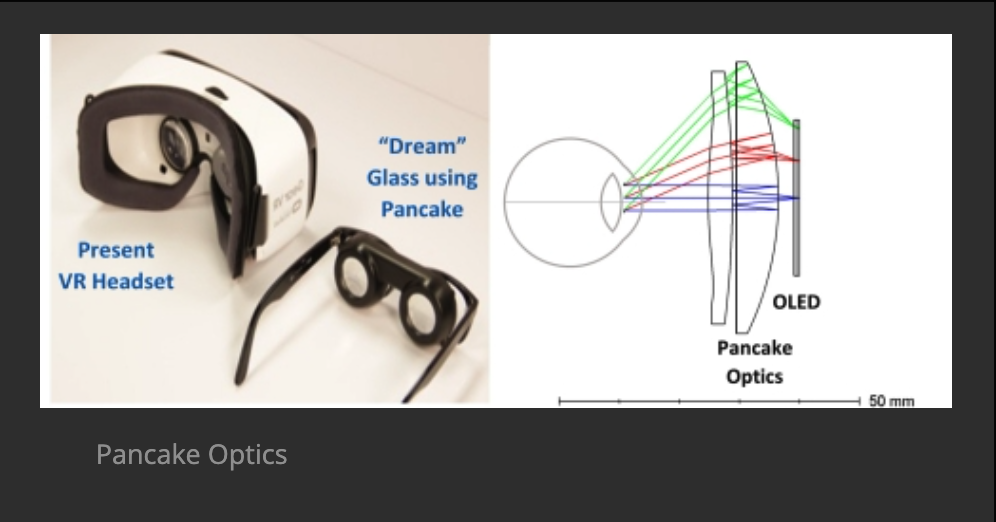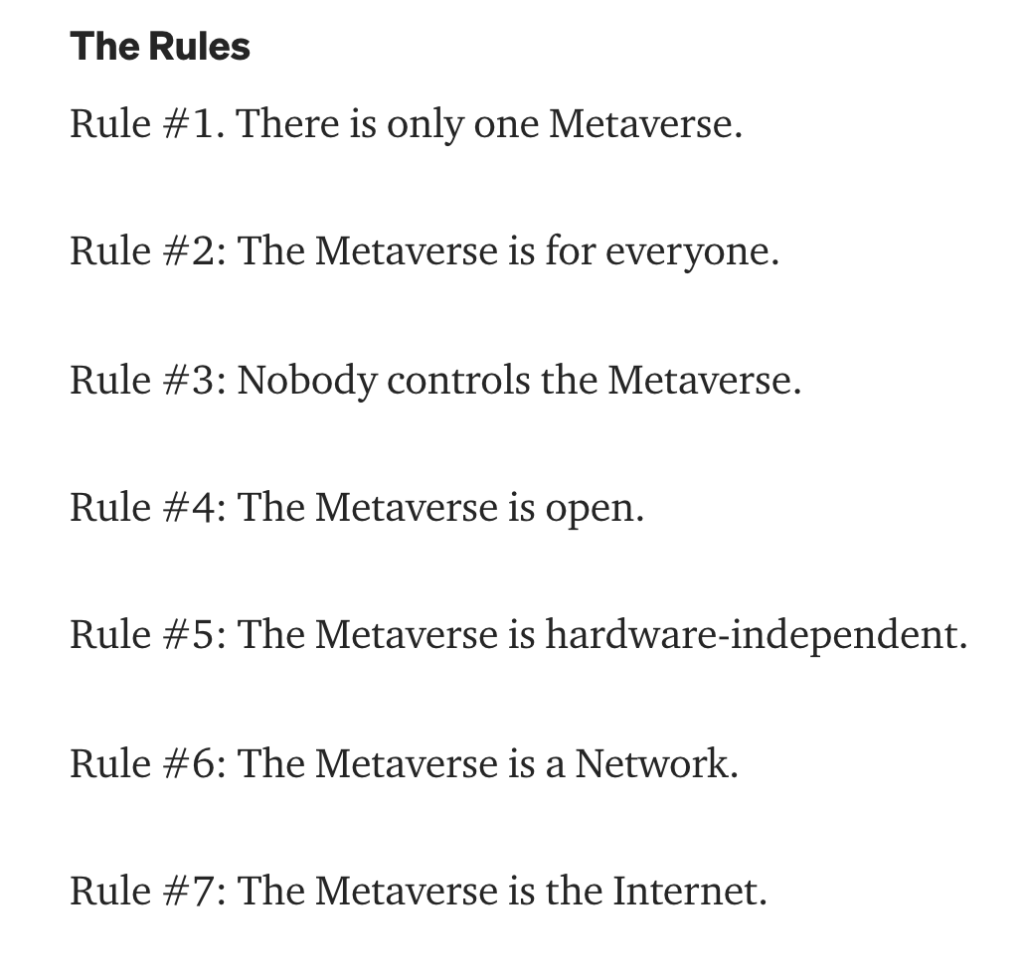Facebook will be rebranded as Meta, creating an immersive virtual experience—one which will almost certainly usher in a digital revolution that could transform all manner of human endeavor. People will interact with each other in digital spaces in a combination of augmented, virtual and mixed reality—the next evolution for the internet. Zuckerberg calls it "an embodied Internet."
Notably, Facebook and its portfolio of companies, with 78 companies acquired over 15 years, will trade under the NASDAQ stock ticker symbol MVRS, not Facebook, starting on Dec. 1.
Facebook Connect 2021: Meta Announced
Zuckerberg's 90-minute presentation explains the rebranding and the company's plans for technological innovation for what he calls the Horizon Meta Platform. Horizon Meta is the Virtual Reality (VR) Metaverse made up of many different interactive spaces serving various purposes and functions for the user.
What is Meta?
Zuckerberg sees Meta as a transformative way to interact. It is, he boasts:
"The successor to the mobile internet. We will be able to feel present, he says, like we're right there with people no matter how far apart we actually are. We will be able to express ourselves in new, joyful, completely immersive ways, and that's going to unlock a lot of amazing new experiences. When I send my parents a video of my kids, they're going to feel like they're right in the moment with us, not peering through a little window.
When you play a game with your friends, you'll feel like you're right there together in a different world, not just on your computer by yourself. And when you're in a meeting in the Metaverse, it'll feel like you're right in the room together making eye contact, having a shared sense of space, and not just looking at a grid of faces on a screen."
"The feeling of presence—this is the defining quality of the Metaverse," says Zuckerberg, "Humans will be represented by Avatars, and those avatars will operate across spaces. Teleporting across worlds."
Zuckerberg continues:
"You'll probably have a photorealistic avatar for work, a stylized one for hanging out, and maybe the fantasy one for gaming. You're going to have a wardrobe of virtual clothes for different occasions designed by different creators and from different apps and experiences. Importantly there you should be able to bring your avatar and digital items across different apps and experiences in the verse beyond avatars."
He explains the spaces will be designable by the user, with places to store pictures, videos, and digital goods. In the future, many physical objects in the Metaverse will be holograms and will be "made by all of us."
"Lots of things that are physical today like screens will just be able to be holograms in the future, says Zuckerberg a physical TV—it'll just be a $1 hologram from some high school kid halfway across the world, and you'll be able to take your items and project them into the physical world as holograms and augmented reality too you're going to move across these different experiences on all kinds of different devices."
"Privacy and safety are important," says Zuckerberg. The ability to "block someone from appearing in your space or when you want to take a break and teleport to a private bubble to be alone" is a priority for the company. Zuckerberg says it will take about ten years to fully realize this immersive technology.
VR Hardware and the Horizon Platform
While the technology needed to fully immerse oneself in this Metaverse is nowhere near fully developed, Facebook already started the process with its $2 billion acquisition of Oculus in 2014—just two years after Founder Palmer Luckey launched Oculus.
Oculus Quest is being phased out in favor of Horizon Quest—and will be used in Meta's Metaverse of spaces. Oculus Quest 2, Facebook's "all-in-one VR," is the Next Generation version of hardware. It required a Facebook account and was announced in Sept. 2020. It costs $299 and will likely be ditched once the more immersive Meta hardware comes along.
 Zuckerberg/Meta
Zuckerberg/Meta
Zuckerberg announced his plans for his rebranded Meta Horizon platform at the eighth Connect 2021 event on Thursday. Meta Horizon is the nucleus of a platform that will create an immersive experience with the help of the Oculus Quest 2 headset—at least for now. He also described his partnership with Ray-Ban, announced in September, introducing "Ray-Ban Stories" smart glasses to help build an augmented reality when the wearer is "out in public."
According to Technology Review, users can "record and share images and short videos, listen to music, and take calls while using the glasses. The people who buy these glasses will soon be out in public and private spaces, photographing and recording the rest of us, and using Facebook's new "View" app to sort and upload that content."
Some warn it will not be all fun and games with the widespread adoption of smart glasses. The glasses encourage a perspective of the world that is guided solely by the needs and wants of those who wear them—which could mean less real-life interaction with others—an already problematic consequence of the plethora of social media and messaging choices on the internet.
As Technology Review points out:
"With this product, Facebook is claiming the face as real estate for its own technology. The glasses will become a perpetual viewfinder, emphasizing each wearer's perspective over the experience of being in any group. As a result, people wearing them may be more drawn to capturing scenes from their unique point of view than actually participating. Also, since more than one person at a time might be wearing the glasses in any given group, this effect could be magnified, and social cohesion could be further fragmented."
Interesting to note, when Google announced its version of glasses, called Google Glass, in 2018, it received massive public pushback due to privacy standards. It was a remarkable example of a time when "human beings setting boundaries and pushing back against surveillance," something the public is not always successful at doing.
Zuckerberg, however, says not to worry about privacy concerns with the Ray-Ban Stories glasses. They feature a built-in LED light that turns on when the wearer uses the features associated with the light, although it is barely noticeable. His statement is not particularly reassuring given how Facebook has handled its users' privacy concerns in general since its inception in February 2004.
Facebook has also discussed putting facial recognition capability into the glasses, also not very comforting in light of what can be done with that kind of power at one's fingertips. It certainly gives one pause when masking has been the standard during the "pandemic." What better way to lay a foundation for a world where masks are the norm but smart glasses are the answer. In any case, a company that plans to dominate the Metaverse may not be highly incentivized to hold itself to the standards to which it portrays itself to aspire in its public-facing statements.
 Ray-Ban Stories/Facebook Says privacy protected
Ray-Ban Stories/Facebook Says privacy protected
Buzzfeed's Katie Notopoulos took the Ray-Bans for a "test ride." She describes them as "barely perceptible spyglasses" and says it is very easy to cover the light to further disguise their true purpose. She also admonishes that maybe:
 Ray-Ban Stories
Ray-Ban Stories
"[Y]our data and images may be safe from the prying eyes of Mark Zuckerberg, sure, but the real danger here isn't to your data—it's the fact that you're walking around wearing barely perceptible spy glasses, taking videos, and photos of anyone you want, likely without them noticing. Photographing people without their knowledge is usually merely creepy, but a vengeful ex or jealous partner using this technology to threaten, blackmail, or embarrass someone is harmful. And that second scenario seems likely to play out in real life.
Facebook's Project Aria glasses are not a consumer prototype, but the research from Aria forms the building blocks for the newly announced Project Nazaré prototype glasses. They are not yet available to the consumer.
Zuckerberg has big Next Generation plans for these "normal and great looking glasses." He eventually wants to "invent a completely new optical stack that's not based on screens." Describing the technology as "fitting a supercomputer into a pair of normal-looking glasses," Zuckerberg says they require extraordinary miniaturization of technology to fulfill his dream of a total immersion experience in a wearable.
The research from Aria will inform future best practices to "develop the safeguards, policies, and even social norms necessary to govern the use of AR (Augmented Reality) glasses and future wearable devices."
"As a research device, the [Aria] glasses will use sensors to capture video and audio from the wearer's point of view, as well as eye movement and location data to help our engineers and programmers figure out how AR can work in practice. The glasses will encrypt, compress, and store data until it's uploaded to a separate, designated back-end storage space."
According to Zuckerberg, the Nazaré glasses—"the first full augmented reality glasses"—are still a few years out. A Video explaining the remarkable technology demonstrates Nazaré's ability to capture uncanny human likeness and expression. The hardware aims to accurately sense the external environment, allowing fluid interaction with actions and holograms in the realistically mapped "inclusive environments in virtual spaces." Ray-Ban Stories, per Zuckerberg, were only "a step toward" Nazaré glasses.
"The Nazaré glasses will enable users to view, interact and converse with holograms, beam into live concerts, visit the metaverse for afterparties, trade in digital and physical goods, and much more."
Immersive Spaces and the Horizon Meta Platform: The Next Virtual Reality (VR) Frontier
Chief technology officer in waiting, Andrew Bosworth, explained in a Facebook post that starting in 2022:
"VR will be the most immersive way for people to access the Metaverse and, as we look toward our goal of bringing 1 billion people into VR, we want to make it clear that Quest is a Meta product. For this reason, we're simplifying our brand architecture and shifting away from the Oculus brand for our hardware. Starting in early 2022, you'll start to see the shift from Oculus Quest from Facebook to Meta Quest and Oculus App to Meta Quest App over time. We'll also expand Meta Horizon as the brand that will encompass all of our first-party immersive social experiences. You've seen this already with Horizon Workrooms and Horizon Worlds. Soon you'll see us shift from Oculus to Horizon Home, Horizon Venues, Horizon Friends, and Horizon Profile."
Horizon Friends and Horizon Profile are still under wraps; however, descriptions of several of the Meta spaces can be found below:
- Horizon Workspace to accommodate the growing remote work environment, which launched in beta in August;
- Horizon Worlds—a diverse, global community of augmented and virtual reality users; Horizon Marketplace for Virtual Reality commerce;
- Horizon Home, "where people can now invite friends to join them in activities such as gaming, hanging out, and watching videos."
- Horizon Venues enables people to enjoy the energy of live events from home, with National Basketball Association games returning to the platform early next month.
- Horizon Friends
Meta will also develop immersion experiences to be used in schools—" allowing teachers and parents to transport their kids to different eras and more." Facebook plans to invest $150 million in an initiative to train creators to "build immersive educational content."
"Beyond entertainment and social experiences, the Metaverse stands to radically transform the way we learn as well. We're already seeing this with educational content and immersive training in healthcare, the automotive industry, and more, says Tech@Facebook."
Zuckerberg is targeting younger users with Meta partially because of the drop in Facebook usage by that demographic. Verge reports that the use of Facebook by teens has dropped, in part, because of competition from Apple iMessage and TikTok.
"Teenage users of the Facebook app in the U.S. had declined by 13 percent since 2019 and were projected to drop 45 percent over the next two years, driving an overall decline in daily users in the company's most lucrative ad market. Young adults between the ages of 20 and 30 were expected to decline by 4 percent during the same timeframe. Making matters worse, the younger a user was, the less on average they regularly engaged with the app. The message was clear: Facebook was losing traction with younger generations fast."
Tech@Facebook lays out its "exciting new vision" for Meta Horizon—a comprehensive suite of virtual spaces, VR hardware, a transition from the 2D apps like Messenger, Slack, Instagram to VR apps.
Horizon Home is one of the several virtual spaces in the works.
Presence Platform is also discussed by Tech@Facebook. Presence Platform is the sauce behind the various spaces. It is "a suite of machine perception and AI capabilities—including Passthrough, Spatial Anchors, and Scene Understanding—that will let developers build more realistic mixed reality, interaction, and voice experiences that seamlessly blend virtual content with a user's physical world."
Interaction SDK is one of the building blocks for the database of capabilities for the Presence Platform that adds "high-quality hand interactions to their apps by providing a library of common gestures." It also features Voice SDK Experimental, powered by Wit.ai, a voice interface company Facebook acquired in 2015 is working toward of library of voice features. It is a hands-free virtual experience.
Project Cambria encompasses "next-generation all-in-one VR hardware" and will be launched in 2022. Per Tech@Facebook, the new VR and AR headset featured in Project Cambria:
"Will be a high-end device at a higher price point, packed with all the latest advanced technologies, including improved social presence, color Passthrough, pancake optics, and a lot more. The experiences developers create with Presence Platform will really shine when the hardware leaps forward, and we're designing Project Cambria for people who want to start testing out a new kind of computing on the cutting edge of what's possible today."
 Pancake Optics
Pancake Optics
The Project Cambria headset "will do much that Quest cannot, including sensors for tracking facial expressions and maintaining eye contact, full-colour passthrough for better-mixed reality and a sense of depth and perspective, and pancake optics that will deliver a better visual experience."
The development of a library of ultra-human, realistic facial expressions is also a top priority for Facebook engineers designing the immersive VR experience.
![]() Real World Facial Expressions/Project Cambria
Real World Facial Expressions/Project Cambria
Community Creators and Training
A big part of Zuckerberg's vision is to include the "community" in the development of Meta. Spark AR (Augmented Reality) is a community of creators who create and share "augmented reality experiences that reach the billions of people using the Facebook family of apps and devices." The Spark AR curriculum is a "free, online a free, online learning program designed to help teach beginner-level creators how to build AR experiences using the Spark AR platform."
Facebook has added a certification program as well—"a formal program to demonstrate their knowledge and proficiency with Spark AR, and to earn a Facebook Certified Spark AR Creator badge."
What Do Adopters of VR and the Metaverse Say?
The development of the Metaverse is an inherently global project mired in buzzwords and belief systems embraced by the Great Reset crowd. VR software and 3D pioneer Tony Parisi formulated what he coined as the Seven Rules of the Metaverse—"A framework for the coming immersive reality." He says there is only the Metaverse, just as there is only one Internet.
 Metaverse/The Seven Rules/Tony Parisi
Metaverse/The Seven Rules/Tony Parisi
The Metaverse is "ethnographic...with political and social implications," writes Parisi. No one controls it, he adds, but it is "governed by "the universal commons for digital communication and commerce, intermediated as needs dictate, governed as required for the common interest, toward the greatest good for the greatest number."
The technology should be accessible to all, "designed flexibly to accommodate individuals with disabilities or impairments."
It is an "open ecosystem..built upon interoperable technologies and tools, connected via rigorously defined and broadly agreed-upon free and open communications standards." Content "should be designed and implemented to run on any device."
Parisi says that the Metaverse is not a computer program but a computer network with "worlds or spaces" within it. It is a "digital commons" that uses the Internet's infrastructure.
"The Metaverse is a computer network connecting the world's publicly accessible virtual experiences, real-time 3D content, and related media.
From a technical standpoint, the Metaverse is a network of computers delivering and presenting digital information. Its novel power is in the ability to present that information to its users in the form of 3D spaces, places, objects and characters, to facilitate communication for a wide range of uses."
Writers on the subject of the Metaverse like Matthew Ball state it will require "a heavily decentralized platform built mostly upon community-based standards and protocols (like the open web). This doesn't mean there won't be dominant closed platforms in the Metaverse." Ball added:
"The Metaverse is not just another YouTube or Facebook-like platform in which countless individuals can 'create,' 'share,' and 'monetize' content, and where the most popular content represents only the tiniest share of overall consumption. The Metaverse will be a place in which proper empires are invested in and built and where these richly capitalized businesses can fully own a customer, control APIs/data, unit economics, etc. In addition, it's likely that, as with the web, a dozen or so platforms hold significant shares of user time, experiences, content, etc."
Ball explains that the Metaverse will require consensus on standards and rules with which we already struggle mightily today:
[T]he more valuable and interoperable the Metaverse is, the harder it will be to establish industry-wide consensus around topics such as data security, data persistence, forward-compatible code evolution, and transactions. In addition, the Metaverse will need altogether new rules for censorship, control of communications, regulatory enforcement, tax reporting, the prevention of online radicalization, and many more challenges that we're still struggling with today.
The Great Reset: Big Plans for the Metaverse
The World Economic Forum's (WEF) comments on Meta reveal agendas beyond leisure or the casual use of social media platforms. The WEF sees the potential for a "transformative medium for social and business engagement" that is dependent on the "widespread adoption of extended reality." WEF writes, "[The Metaverse] links digital assets to real-world economic activity in the metaverse."
The implications are profound. Commerce could become the property of a small but powerful global elite—one that is increasingly in control of the economic and interactive human experience. Those who control the money and the technology will be in control of the tools and the access to all manner of human endeavor. And, everything on the internet is hackable. Who is to say we will not somehow be held hostage by the Metaverse overlords?
 Metaverse Graphic/
Metaverse Graphic/
It could prove to be an irresistibly seductive world for the young, anxious to participate in a new, enhanced and immersive world—buying digital commerce with the power at their fingertips to transform their identities to idealized versions of themselves.
As the Metaverse emerges and takes over, Facebook and other tech giants in partnership with governments worldwide will almost certainly begin to simultaneously shut down old ways of interacting in favor of the Metaverse—a universe no longer inhabited by or controlled by the common, real-life human. Interactions between holograms and avatars will supplant interactions of flesh and blood. Old platforms will be phased out, seen as obsolete, moving to an immersive world that could prove to be even more addictive than the internet platforms of yore.
Commerce will change too. Physical storefronts could become a thing of the past. Mom and pop businesses could become all but obsolete in this paradigm. The WEF writes:
"For example, it is plausible that Peloton, a company producing exercise equipment and video-streamed fitness classes, would not exist without the App Store. Without a widely adopted medium for digital consumer experiences, a service literally grounded in physical activity would have a weak business case for going online."
It doesn't take much browsing on the World Economic Forum's Youtube Channel to realize they have big plans to influence and transform almost every part of the human experience. From trans-humanism to economics, to the development of personalized medicine and vaccines, metabolic engineering, digital assets, trade, and the World Bank were all part of the plan at the WEF.
It is a borderless world with inventions like self-driving cars, mobile supercomputing, AI robots, neuro-technological brain enhancements, and so much more. Klaus Schwab's WEF makes clear its vision: "A successful vision of the metaverse sees transformations like these taking place at an accelerated pace and universal scale."
The immersive VR Metaverse is how men like Zuckerberg, who share Schwab's vision for the world, realize the "roadmap for increased global collaboration" and economic cooperation. COVID-19, Schwab says, has ushered in the use of the internet as a way to encourage "private/public collaboration." The Coronavirus, says Schwab, has produced "more progress in the last four months than in the last ten years. Virtual collaboration tools have increased by 600 percent."
In fact, there is a whole page on the WEF website devoted to the Digital Transformation Initiative (DTI), launched in 2015. The 75-page Executive Summary can be found here. It has the potential to be the stuff nightmares are made of—if you are not a globalist.
Schwab gave a speech in June of 2020 and talked about digital transformation at the 50th annual meeting of the WEF called "The Great Reset."
RightsCon, formally RightsCon Silicon Valley, is a player in the world of digital interaction that recognizes the need for—privacy and safety, appointing itself to the policing of "human rights in the digital age." But that does not mean they advocate for a world without the Metaverse. The graphic below shows the ways such a world will be interconnected.
RightsCon expresses the idea that, with the evolution of a digital universe, "digital rights are actually human rights in the digital age; that the corridor is as important as the stage; that getting culture right is more essential than getting strategy in place; that a crowdsourced program is better than a centralized one."
However, it is a lofty goal to wrestle power away from those who have been so doggedly pursuing it for so many years. Moreover, RightsCon is openly committed to concepts like equity, diversity, identity politics, and more—hardly a watchdog advocating for the average, red-blooded American Joe.
The organization looks less like a watchdog and more like one aligned with the proponents of the Great Reset—not a great example of the checks and balances needed to prevent a Metaverse that favors the elites.
In a welcome speech for the Opening Ceremony of RightsCon 2021, the Executive Director, Brett Solomon, reflected on ten years of RightsCon:
"Such global convulsions have thrust new topics onto our agenda. We've come to scrutinize the intersection of public health, data collection, disinformation and technology, and explore ways to bring the power of the digital rights movement to the climate crisis.
We have also made mistakes and have, as a result, been required to look in the mirror. On gender, on race, and on how to recognize arbitrary power. I'm really pleased that over 60% of session proposers this year identify as women. That's an extraordinary percentage at a tech conference and even higher if you look at the sessions by those who identify as non-binary or third gender.
Zuckerberg Is a Major Player in the Evolution of the Metaverse
Many have repeatedly experienced the real-world consequences of digital platforms like Zuckerberg's Facebook. It has been an integral player in the policing and dissemination of "the correct information" on COVID-19 and the vaccine. It has all but functioned as a significant watchdog, censoring the speech of those with whom those behind the platform disagree.
The pandemic has served the elites of the world well—"expediting" the Great Reset while pushing digital dependence on humanity. The result: an internet that largely shows us what they want you to see, know, and buy. Despite protestations to the contrary from Big Tech and their allies, the internet has often become a space that fails to unify but, instead, divides.
The Metaverse is almost certainly a giant step toward realizing more fully the dreams of a global, Great Reset agenda as it intersects with users of immersive virtual reality in ways we cannot yet fully comprehend.
TruthTalk.uk speaks to the digital revolution coming our way:
"Klaus Schwab, co-founder of the World Economic Forum, pioneered the Fourth Industrial Revolution and Great Reset concepts, arguing that all human life will be digitized and that COVID-19 presents a unique opportunity to make it all happen. The UK's health secretary Matt Hancock also gave a speech on the Fourth Industrial Revolution to Parliament in October 2017.
Schwab wrote: "the Fourth Industrial Revolution will lead to a fusion of our physical, digital and biological identity and [This will be a result of technology which] will almost certainly become implantable in our bodies and brains…"
Digital passports that are no longer 2D but immersive portend a future of transhumanism where the digital and the human begin to blur—all part of the "The Fourth Industrial Revolution." Medical health passports, social credit scores—already implemented in China— are other examples of what the future will undoubtedly bring if proponents of a whole world order have their way.
A terrifying thought is that our bodies may become so high tech "we won't be able to distinguish between what's natural and what's artificial." And who is to say your body won't be hacked in that world—putting your "human data into the hands of the powerful few."


